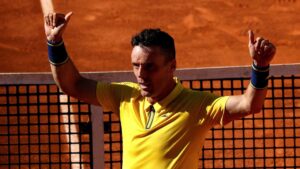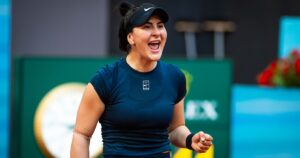
CHARLESTON, S.C. — Sloane Stephens, scheduled to play three potential matches on Thursday, got a welcome reprieve when she won her first singles match of the day.
Stephens’ doubles match with Ashlyn Krueger was pushed to Friday and she was free to focus on her second — against blistering-hot Miami Open champion Danielle Collins. That bonus match for fans took place about five hours after Stephens’ straight-sets victory over Leylah Fernandez.
Collins, playing her second singles match of the day, won the All-American tilt 6-2, 6-2. It was her 10th win in a row.
“Obviously not easy coming out and playing two matches back to back,” Collins said afterward. “But very rewarding thing to be able to accomplish against two very incredibly high-level players — a Top 6 player and a Grand Slam champion.
“I should be able to take this as confidence moving forward.”
If you’re looking for a cushy 9 to 5 job, it’s not going to be in professional tennis. The schedule is fluid and, in the absence of a roof, sometimes so is the weather.
It was an extremely unstable situation Wednesday at the Credit One Charleston Open, as rain delayed the start of play more than six hours. Four singles matches were pushed into a crowded Thursday schedule. Fortunately, it was the only major disturbance in the weeklong forecast. Unfortunately, it forced some players to double up.
No.7 seed Elina Svitolina and No.11 Elise Mertens also won early matches and advanced to play each other. Svitolina defeated Daria Saville 6-2, 6-4 and Mertens was a 6-4, 3-6, 6-2 winner over Varvara Gracheva.
On Friday, it will be Mertens — a 6-4, 6-1 winner over Svitolina — against Collins in the quarterfinals.
As a 10-year-old playing matches in Puerto Rico, Monica Puig said she played two matches in a single day all the time. But as she moved up the tennis ladder, it happened less frequently. She can count on one hand the times it happened as a professional.
In Charleston as a tournament ambassador, Puig said two-for-ones are precisely what tennis players train for.
“When we do preseason training, we’re out there two, two-and-a-half hours in the morning, two, two-and-a-half hours in the afternoon,” said Puig, the singles gold medalist at the 2016 Rio de Janeiro Olympics. “Five hours on the court, a couple more for fitness, that’s an eight-hour day at the heaviest. During the season, it’s more maintenance.
“So, physically, it shouldn’t be an issue. It’s more of a mental thing, to be properly prepared for your first match — and that’s the only thing you’re thinking about. And when it’s done, you and your team get together and figure out what’s the best way to recover and get ready for the next match. You just roll with it. Leave whatever happened in the first match and move forward.”
And while it’s a relatively rare occurrence in singles, a number of high-profile singles players also play doubles and are accustomed to playing twice in a day. But that doesn’t mean it’s easy.
Double Duty 💼
Danielle Collins extends her win streak and defeats both Jabeur and Stephens today! ⬇️#CharlestonOpen
— wta (@WTA) April 4, 2024
A single match can be tough enough to navigate, but two? It’s two unique sets of circumstances — opponents, time of day and conditions. There are myriad challenges.
CoCo Vandeweghe, who retired at the end of the 2023 season, is working here for Tennis Channel.
“I’ve played two here in Charleston before — it’s just kind of the way the cookie crumbles,” Vandeweghe said before calling the Jessica Pegula-Magda Linette match. “Hopefully, the stringers can get your racquets all done in time. There’s a lot of things you’ve got to organize and get ready.”
For example, preparing for different conditions.
“They can be massively different,” Vandeweghe said. “They’re lucky they didn’t start these matches earlier. I’ve started matches at 9 a.m., and that’s a very different look. When we were in Chicago, during one of the COVID years — that was brutal, getting up at 5:30, you’re getting your warmup in and the shuttle, etcetera. A lot of behind-the-scenes stuff.”
When the rain came Wednesday, tournament director Bob Moran moved quickly to postpone the four matches at the bottom of the draw, so the survivors would play at the same time Thursday, guaranteeing no one would have an unfair advantage.
And in that case, Puig stressed, “It all comes down to who can recover the fastest [snapping her fingers]turn the page quicker.”
There was a good crowd for the 11 a.m. matches, where a pair of unseeded Americans advanced to their third-round match. Collins defeated World No.6 Ons Jabeur 6-3, 1-6, 6-3 on the stadium court. Meanwhile, over on Althea Gibson, Stephens handled Fernandez much more easily.
Both matches were completed around 1 p.m., meaning the two winners had five hours to prepare for the next one.
Jessica Pegula was one of the lucky ones, getting in her Wednesday match against Amanda Anisimova — 3-6, 6-4, 7-6 (3). She is a first-rate multitasker; last year, she played 77 singles matches and another 48 in doubles with Coco Gauff. That’s 125 matches, with two on the same day quite often.
Pegula, ranked No.5 in the world and the top seed in Charleston, is not playing doubles this week. She’s into Friday’s quarterfinals, relatively early, and had some sympathy for Collins and Stephens.
“Yeah, tough,” Pegula said. “Been in that position many times. You just have to have the right mindset, I think, going into it. Knowing that the schedule can be difficult, because sometimes that’s just how it is.
“And then you’re fine as long as you know that.”
Vandeweghe said she always welcomed the extra day to decompress after winning a match.
“Eat, recover, talk it over with your coach,” she said. “Let’s go over who we’re playing next. Come back and reset. It’s a new day.
“You can almost take it like an NBA game, where you do your shootaround, your warmup, go home, take a nap and come back for the real show.”
Puig couldn’t quite remember the specifics of her two-in-one experiences — maybe it was just denial.
“Because I don’t want to go back to those days, for sure,” she said, laughing. “Because they were really hard. But after the match, you put your feet up, get a good meal … pasta, chicken and rice, whatever. Take a nap and completely disconnect.
But then, you’ve got to warm up and do it all over again. In tennis, there’s no time limit to what you’ve got to do out there. You’ve just got to pony up and do your job.”
Source: https://www.wtatennis.com/news/3954122/charleston-double-duty-inside-the-challenges-of-playing-twice-in-one-day


